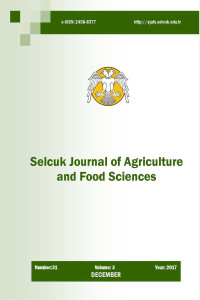Öz
Turkey, with its olive oil production and export potential, is one of the leading countries in the world. For this reason, it is a direct contribution to the economy of the country which helps Turkey maintains the sustainable competition superiority in changing international trade conditions in the olive oil sector. The objective of this study was to analyze the international competitiveness of the Turkish olive oil sector with different indicators. Balassa and Vollrath Indexes were used for measuring the international competition level of Turkey in the olive oil sector. In addition to these indexes, other indicators such as the export/import ratio, import penetration ratio, openness to international competition, net export ratio and specialization coefficient were also used in the study. The aforementioned indicators were also used for making comparisons with important producer countries. One of the main results of the analyses was that Turkey has important advantages in the global olive oil trade. Turkey’s openness to international competitiveness was 0.10% which is a figure lower than those of all the other countries. This is a finding which proves that the olive oil industry in Turkey has almost zero dependency to other countries. However it does not have sufficient international competitive advantage when compared with other leading countries in olive oil production and exportation.
Ayrıntılar
| Birincil Dil | İngilizce |
|---|---|
| Konular | Ziraat Mühendisliği (Diğer) |
| Bölüm | Araştırma Makalesi |
| Yazarlar | |
| Yayımlanma Tarihi | 29 Aralık 2017 |
| Gönderilme Tarihi | 10 Ekim 2017 |
| Yayımlandığı Sayı | Yıl 2017 Cilt: 31 Sayı: 3 |
Kaynak Göster
Selcuk Journal of Agriculture and Food Sciences Creative Commons Atıf-GayriTicari 4.0 Uluslararası Lisansı (CC BY NC) ile lisanslanmıştır.

